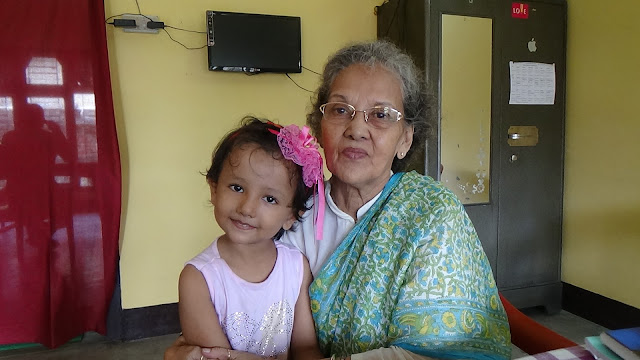Dementia- A fast Approaching Epidemic
Mrs.
Sharma, 68 year old, is a retired Professor of French from a renowned University.
These days she is busy being an active grandmother .One day while driving back
home after picking her grandkids from school she suddenly got confused with the
directions and kept driving until the kids panicked and asked grandmother to
stop the car.
“Mom
must be really stressed looking after the grand kids and perhaps need a break
from it” , her daughter said.
Few
years later when she started confusing names of her children and husband, she
was taken to a neurologist and was diagnosed with a moderate stage of Alzheimer’s
Dementia.
We
often associate episodes of memory loss or confusions to be a part of ageing
process which delays the diagnosis of Dementia. Forgetfulness is not a
characteristic feature of ageing. Forgetting occurs due to many other reasons
like misattribution, extreme stress, lack of attention etc. On the other hand
when forgetting affects activities of daily living it can be Dementia.
Dementia
is a syndrome-usually of a chronic and progressive nature-in which there is a
marked deterioration of cognitive functions (i.e. the ability to process
thought) beyond what might be expected of normal ageing It involves the
progressive loss of mental and ultimately physical functions in the individual,
which results from the ongoing and irreversible death of brain cells. It is one
of the conditions that are seen to be increasing at a staggering rate. India
stands among the top 3 countries for the individuals suffering from Dementia
housing nearly 4.1 million people out of the 47 million people living with
dementia globally. (World Alzheimer’s
Report, 2015).
Treatment
of such a progressive condition involves a balance of variety of treatment
modalities to make sure that the quality of life of the individual can be
maintained. Though the condition is progressive, treatment is basically aimed
at delaying the onset or slowing down the progression of the condition.
Family
members play a major role in management of dementia and for them it is very
important to understand the disease and its progression to plan for it
accordingly. Primary Care givers of dementia are often known as the invisible
patients as their journey along with their loved one with Dementia is an
emotional rollercoaster ride every day.
Your
loved one who has lived a very active life doing everything may now have
difficulty managing even the basic activities like eating, bathing, dressing etc.
Here it is important to understand that the cognitive faculties of your loved
one is gradually deteriorating, so, things or people around do not make sense
to them anymore, hence leading to confusions and anxiety. So caregivers should
try creating an environment of unconditional love and assurance so they feel
wanted and have a purpose in life. At the same time our goal is also to keep
them independent for as long as possible.
In
India, Dementia care is still at its infancy while prevalence of the disease is
increasing at an alarming rate. ARDSI (Alzheimer’s and Related Disorders
Society of India) is one of the strongest organization developed with the aim
to provide help and support by establishing memory clinics, day care centers, respite
care, training programs etc.In
recent years, few more organizations have come up with dementia care services like
home based interventions, providing dementia trained attendants etc. Still
there are huge deficits of practitioners in this field thereby making it more
difficult for the affected families.
Dementia
may take away their memories but they remain the same person and feel the same
way .All they need is more of our time and acceptance.
“People
with dementia are still people and they still have stories and they still have
character and they are all individuals and they are all unique and they just
need to be interacted on a human level” – Carry Mulligan
Debastuti Baruah
ARDSI,Guwahati Chapter

Comments
Post a Comment